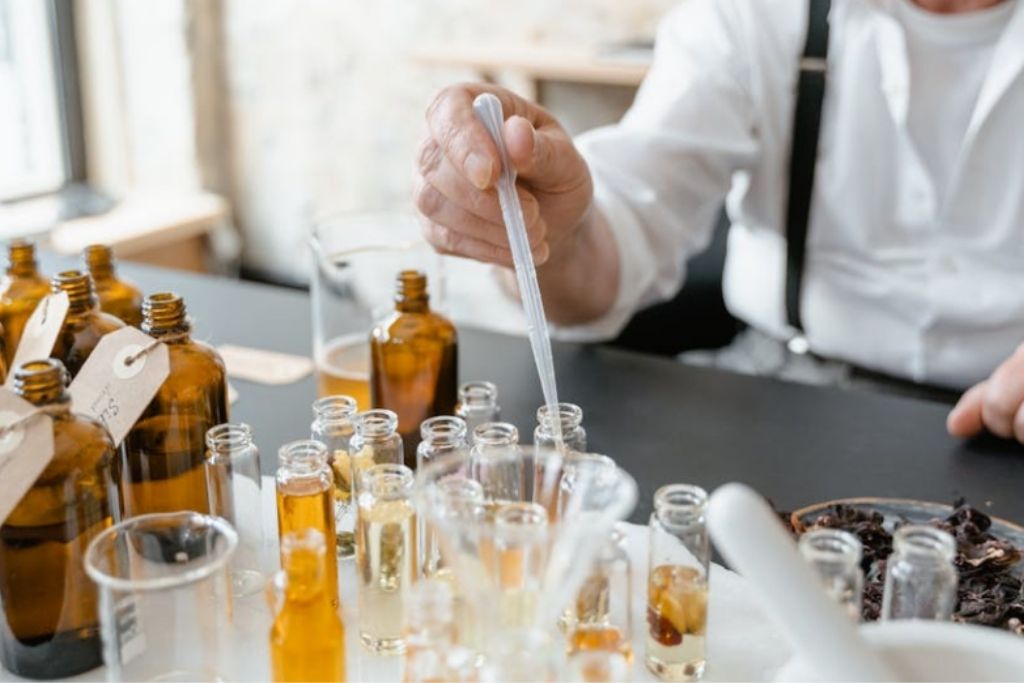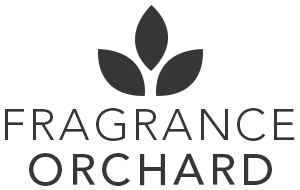Vegan and cruelty-free fragrance oils are where ethics and creativity meet. Instead of old-school animal-derived ingredients like musk or ambergris, these blends rely on plant-based or lab-made alternatives that smell just as good (minus the harm). They’re made without animal products and aren’t tested on animals, so you get a more compassionate, sustainable scent experience.

Making these oils isn’t just about swapping raw materials. It’s a careful production process of formulation and animal testing, trying to strike that balance between purity, performance, and a scent that actually makes you want to sniff your wrist all day.
Brands stick to regulations like IFRA and CLP, keeping things safe and consistent. Plenty of producers, especially those behind 100% plant-based fragrance oils, focus on eco-friendly, skin-safe materials for people who genuinely care about what goes on their bodies.
What Are Fragrance Oils? Distinguishing Them From Essential Oils
Fragrance oils are a blend of chemistry and artistry, designed to mimic or amplify natural aromas. They’re different from natural essential oils, which are pulled straight from plant matter, because they mix natural ingredients and synthetic products for a consistent, long-lasting fragrance.
Understanding Fragrance Oils: Blends Of Art And Science
Fragrance oils are lab-created aromatic blends (sometimes all synthetic, sometimes with a splash of natural). The whole point is to get stable, reliable scents that don’t fade or change from batch to batch. Many are vegan, cruelty-free, and paraben-free, as Candle Shack points out.
Manufacturers mix up fragrance molecules, fixatives, and carriers so the scent holds up in candles, soaps, air fresheners, perfumes (you name it). Unlike natural oils, these don’t depend on the whims of plant harvests, so what you smell is what you’ll get every time.
Depending on the recipe, fragrance oils can be purely synthetic or partially natural. That means perfumers can recreate rare, endangered, or just plain expensive scents without draining natural sources. This is a good starting point for reducing environmental impact.
| Type | Composition | Example Use |
| Synthetic Fragrance Oil | 100% lab-created compounds | Perfumes, lotions |
| Natural Fragrance Oil | Mix of natural isolates and synthetics | Candles, diffusers, home fragrance |
Essential Oils: Nature’s Direct Extracts
Essential oils are concentrated plant extracts (think steam distillation, cold pressing, or resin tapping). Each oil captures the unique, volatile compounds that give a plant its signature aroma (and sometimes, its therapeutic kick).
They’re 100% natural, but that means they vary a lot. Climate, soil, and harvest timing all change the scent, which is great for authenticity but less so for consistency.
You’ll find natural oils in aromatherapy, skincare, and natural cleaning products. But they’re strong (usually too strong for direct use), so you have to dilute them with a carrier oil or base. Extracting them takes a ton of raw materials. For example, you might need several pounds of lavender flowers to get just a few ounces of oil. That’s part of why they’re pricier and less sustainable than fragrance oils.
Bridging The Gap: Nature-Derived Fragrances And Accords
Some fragrance oils use natural isolates (single scent molecules from plants) to build more natural-smelling blends. These are often called natural fragrance oils or hybrid fragrances. Carvansons explains how these combine the best of both worlds: natural authenticity and the reliability of synthetics.
Perfume pros use accords (basically, layered scent structures) to balance top, middle, and base notes. That way, they can recreate complex scents like rose or sandalwood without leaning too hard on rare natural sources.
Nature-derived fragrance oils are a solid choice if you want sustainability but still care about how your products smell. They keep things consistent and help avoid overharvesting precious aromatic plants.
The Ethical Foundation: Defining Vegan And Cruelty-Free In Fragrance
Vegan Fragrance: Ensuring No Animal-Derived Ingredients
Vegan fragrances steer clear of anything from animals (no musk, ambergris, civet, or any of those once-common ingredients found in traditional perfumes). Nowadays, brands like Ulric de Varens are all about synthetic products or plant-based swaps. The short answer is that these blends contain zero animal-derived products.
Manufacturers lean on biotechnology and green chemistry to mimic natural scents, minus the animal products. These methods use renewable sources, so it’s lighter on the planet and still delivers on complexity. Getting vegan certified means brands have to be upfront about every raw material and supplier. That way, there’s no sneaky animal products (like beeswax or lanolin) slipping into the mix.
| Common Animal Ingredient | Vegan Alternative |
| Musk (from deer) | Synthetic white musk |
| Ambergris (from whales) | Lab-created amber accord |
| Beeswax | Candelilla or carnauba wax |
Cruelty-Free Production: Our Commitment To No Animal Testing
Cruelty-free means no animal testing (period). Not on the final product, not on the raw materials. Ethical Consumer notes that responsible brands check up on their suppliers and sometimes get third-party certified in the fragrance industry.
Now, safety testing is done with in vitro (test tube) or computer-based methods, which are widely accepted in the EU, UK, and elsewhere. No bunnies or mice are involved in animal testing. You’ll see labels like Leaping Bunny or PETA Approved on cruelty-free oils. These aren’t just for show (they mean nobody’s been tested on, from start to finish).
Navigating Historic Data And Transparency (e.g., SDS Information)
Sometimes, regulatory rules mean developers have to look at old toxicology data (which may have involved animal testing ages ago). This is just for safety paperwork, not new tests. Safety Data Sheets (SDS) list out properties, handling, and hazards for each fragrance ingredient. They’re part of keeping things above board and traceable.
Brands that care about transparency will make SDS info and their animal testing policies public, like NÉIA. It’s a way for customers to check up on ethical claims and see how safety and sustainability actually play out.
The Craft Of Creation: How Fragrance Oils Are Formulated And Produced
Sourcing Raw Materials: Ethical And Sustainable Practices
Producers put plant-based materials and synthetic products front and center, skipping animal-derived ingredients like musk or civet. Ethical sourcing isn’t just about the natural ingredients (it’s about protecting biodiversity and making sure workers aren’t getting the short end of the stick).
Suppliers usually verify their products with certifications for vegan and cruelty-free status. Plenty of UK suppliers make it clear their fragrance oils are vegan-friendly and cruelty-free. Sustainability shows up in packaging and production processes too (think recyclable bottles, less waste, and sometimes even renewable energy). It’s all about shrinking the footprint without sacrificing quality.
Key materials include:
- Natural essential oils from plants and flowers
- Natural isolates from distillation
- Biodegradable carrier oils for blending
The Role Of Synthetic Molecules: Precision And Innovation
Modern perfumery leans on safe, lab-made fragrance molecules to nail those signature beautiful scents. Synthetic fragrances let perfumers control intensity and longevity, and they help keep formulas consistent (no animal products needed).
Compounds like aldehydes, esters, and lactones are used to fine-tune the fragrance structure. Pairfum’s overview of perfumery explains how these fragrance molecules are key to balancing out complex blends.
Lab synthesis isn’t just about copying nature (it’s also about pushing boundaries). New synthetic products can mimic rare notes, cut down on allergens, and make formulas more biodegradable. It’s a win for ethics and performance.
Harnessing Nature: Processing Natural Accords And Isolates
Natural accords start with plant-based sources (flowers, woods, herbs, fruits). They’re processed by steam distillation, solvent extraction, or cold pressing to capture their scent. Each method gives a different character: steam distillation for fresh, volatile notes; solvent extraction for richer, heavier absolutes.
Perfumers can isolate specific molecules (like linalool or eugenol) from these extracts. These natural isolates help build precise accords, working alongside synthetic products to add realism and complexity.
The Art Of Blending: Crafting Complex Scent Profiles
Blending is where the magic happens in the fragrance industry. Perfumers layer top, middle, and base notes to create a fragrance that actually works as a whole, suitable for anything from room sprays to traditional perfumes.
Top notes are your first impression (often citrus or herbal). Middles add the heart, and bases give staying power. Getting them to work well together can take some trial and error. Blending is rarely perfect on the first try. Small tweaks in concentration or solvent can totally change the result.
The Future of Fragrance: A Sustainable and Ethical Scent-Scape
The shift toward vegan and cruelty-free fragrance oils is more than just a passing trend; it reflects a broader consumer demand for transparency, ethics, and sustainability.
As green chemistry and biotechnology continue to advance, perfumers have a growing palette of safe, sustainable, and powerful aromatic compounds to choose from, often ensuring phthalate-free status.
This innovation allows for the creation of sophisticated, long-lasting, and consistent beautiful scents that don’t rely on animal-derived products or animal testing, making it easier than ever for consumers to choose vegan products that align with their values without compromising on quality or performance.
The ethical foundation has been laid, and the future of fragrance is undoubtedly kind.
Frequently Asked Questions (FAQ)
Are “Natural Fragrance Oils” the same as Essential Oils?
No. The short answer is that essential oils are 100% natural essential oil extracts pulled directly from a single plant matter source. Natural Fragrance Oils (or hybrid fragrances) are a blend of natural ingredients (like natural isolates derived from plants) and sometimes synthetic products. They are formulated to be safer, more stable, and more consistent than pure natural oils.
Is a Vegan fragrance always Cruelty-Free?
Not necessarily. A vegan product contains no animal products or animal-derived ingredients. A cruelty-free product means the final product and its raw materials were not subjected to animal testing. Most brands that commit to one will commit to the other, but it’s important to look for both the vegan symbol/claim and a cruelty-free certification (like Leaping Bunny) to be sure.
Why are Fragrance Oils generally considered more sustainable than Essential Oils?
While natural essential oils are natural, their production process often requires vast amounts of raw materials (plant matter e.g., hundreds of pounds of flowers for a few ounces of oil). This can lead to issues with overharvesting and resource depletion, increasing the environmental impact. Fragrance oils, particularly those that use synthetic products or biotech alternatives, require far less natural source input, making their production process footprint smaller and more consistent.
What is the IFRA, and why do fragrance makers follow their standards?
The International Fragrance Association (IFRA) sets global standards for the safe use of fragrance ingredients in the fragrance industry. They issue guidelines and restrictions based on scientific data to protect consumers. Fragrance manufacturers adhere to IFRA standards to ensure their final product is safe, non-irritating, and complies with international regulations like those in the UK and EU, making them suitable for room sprays and air fresheners.
